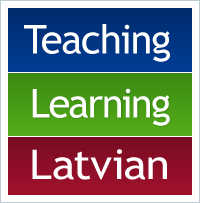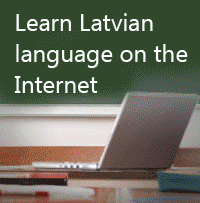Current issues
01.08.2020.
As the summer is gradually coming to an end, this is a good time to present five new study materials by author Līga Gēmute, long time 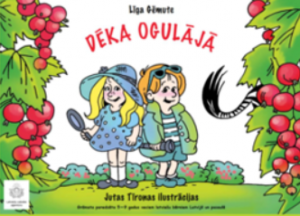 teacher at Latvian schools in the USA and Australia.
teacher at Latvian schools in the USA and Australia.
These new comic books will help in studying and teaching basic grammar rules.
Comic books are meant for 5 – 7 year old Latvians anywhere in the world, but thy can be easily used also in Latvia. Comic books include exercises and paper fingerdolls of characters, that can be cut out for use.
DĒKA OGULĀJĀ – ADVENTURE WITH BERRIES:
maciunmacies.valoda.lv/…/Diaspor…/DekaOgulaja-web.pdf Read more
18.03.2020.
Taking in to the consideration that do to the spread of the Covid-19 virus in Latvia, authorities have declared a state of emergency and all educational class activities in person are canceled, Latvian Language Agency invites third country nationals to participate in the online Latvian language and integration lessons!
For further information and to apply for online lessons, please, send an e-mail to: erika.picukane@valoda.lv Read more
16.03.2020.
Latvian Language Agency starts the implementation of the project of the Asylum, Migration and Integration Fund “Latvian language learning in order to promote third country natioanals’ inclusion in the job market 2 (Nr.PMIF/8/2019/3/01)” and invites third country nationals to participate in the project events that have been planned.
- Latvian language courses
Latvian language courses are planned in groups from A1 to B2 level and they start in March and April 2020. Classes take place in groups of 10-15 people, for a total of 120 hours; at the end of the course students may take a Latvian language test and receive a certificate.
- Latvian language clubs
Third country nationals wishing to improve their Latvian language speaking skills are invited to participate in interactive Latvian language clubs which take place at the same time with the language courses. We invite both those who attend Latvian language courses, as well as those who do not, to participate in the language clubs. Local citizens, who wish to help foreigners to learn Latvian, are also kindly invited.
- Integration courses
In addition to language learning, the project also provides students with the opportunity to learn about integration issues concerning current social, political, economic and cultural processes in Latvia. Innovative and interactive teaching methods are used in the integration courses, for instance, role-play, discussions, etc. Integration courses may be attended both by Latvian language learners and those third country nationals who do not attend such courses. Moreover, close relatives of the target group representatives as well as local citizens are also invited. Read more
04.03.2020.
The Latvian Language Agency, in cooperation with the Daugavpils University is pleased to invite to an informative seminar on November 8th 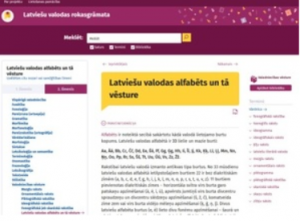 about the new ways for learning and teaching that are available to students, schools, teachers and universities thanks to the newly created Handbook of Latvian Language in its electronic version valodasrokasgramata.lv/
about the new ways for learning and teaching that are available to students, schools, teachers and universities thanks to the newly created Handbook of Latvian Language in its electronic version valodasrokasgramata.lv/
This new language tool and the ways to use it will be presented by Inita Vītola, project coordinator and Head of the Language Development Division. Ilga Jansone, Director of the Latvian Language Institute of the University of Latvia, will tell abotu the content creation for this handbook. Ilga Jansone was also one of the scientific editors and author/co-author of several chapters of this material. Read more
04.01.2020.
In advance of the language days the Latvian Language Agency has announced a photography and story competition on the theme „If It’s a 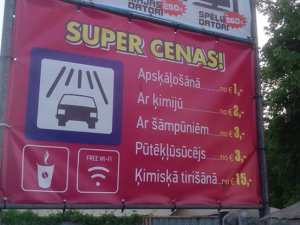 Mistake, Make it Funny” , which ran from 26th September to 18th November 2017. Participants were invited to search for language signs in their environment, such that would attract attention, open up for a pun, play on words, associations and humorous connotations, whilst affirming the richness and beauty of language, its imaginative aspects and the huge possibilities for creative expression through means of language, be it intentional or unintentional. Read more
Mistake, Make it Funny” , which ran from 26th September to 18th November 2017. Participants were invited to search for language signs in their environment, such that would attract attention, open up for a pun, play on words, associations and humorous connotations, whilst affirming the richness and beauty of language, its imaginative aspects and the huge possibilities for creative expression through means of language, be it intentional or unintentional. Read more
11.11.2019.
„My nation is the King Namejs silver ring, carrying in its silver filigree motifs hidden strength, courage and tenacity. My nation is a pair 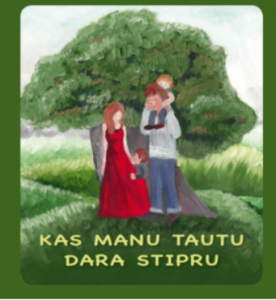 of feet in simple peasant shoes covering space on the earth in rhythms of music. My nation is the happy shout out of victory when its small size is nothing in the face of talent, capacity and dedication. My nation is the age-old folk legends and grandma’s fairytales wrapped up in a soft fragrance of linden flowers.”
of feet in simple peasant shoes covering space on the earth in rhythms of music. My nation is the happy shout out of victory when its small size is nothing in the face of talent, capacity and dedication. My nation is the age-old folk legends and grandma’s fairytales wrapped up in a soft fragrance of linden flowers.”
(Justīne Dižpētere, Eleja Secondary School, Form 12A)
In advance of the 100 year anniversary of the Republic of Latvia, the Latvian Language Agency has published a collection of student essays „What makes My Nation Strong”, presenting the best creative work, essays and drawings by Latvian schoolchildren, who won a competition.
Close to 900 school students from schools in Latvia and abroad participated in the competition, and this volume is a collection of submissions by 242 children and young people, in some cases only excerpts are being published. Chief Editor of this book is Valdis Rūmnieks. The content of this book is inspiring and very timely, as it shows how the young generation perceives the roots of strength and vitality of Latvia. Read more
29.10.2019.
Latvian Language Agency has recently published 9th collection in its series of popular science articles, and this latest issue is devoted to the birth anniversaries and legacy of two outstanding linguists – Kārlis Mīlenbahs and Jānis Endzelīns. In 2013 we celebrated 160th birth anniversary of Kārlis Mīlenbahs and 140th birth anniversary of Jānis Endzelīns. This collection of articles deals with linguistic practice as viewed from diverse perspectives – general questions, language and environment, lexics, grammar, phonetics and phonology, style. Collections features contemporary thought in 13 popular science articles.
Chapter on general questions looks at the herritage of outstanding linguists Kārlis Mīlenbahs and Jānis Endzelīns, as well as an article featuring poetic aspects of spiritual songs by Kristofors Fīrekers. Interesting ideas on the interplay of language and environment are expounded in articles about variants of South-Estonian language in Latvia and on aspects of linguistic identity in Western Latgale and Eastern Vidzeme region. Chapter on lexicology includes a study of contemporary trends in language expression, numerals in Latvian and German paremies, as well as a write-up of an upcoming dictionary of history of Latvian language. Chapter on grammar features articles on prefixes in international verbs and normative aspects of colloquial language. Several exciting aspects of phonetics and phonology are dealt with in a written dialogue between two linguists specializing in Phonetics and Phonology respectively, as well as a write-up on norms of pronunciation in contemporary Latvian language. Chapter on stylistics includes a study on the usage of Dative in Latvian language, and its implications from the point of view of sentence structure and language culture.
Additionally you will find brief articles on language consultations, actual news from the Terminology Commission of the Latvian Academy of Sciences and Expert Commission of the Latvian Language Agency, a brief bibliography of recent publications in the area of linguistics, as well as a page of humour featuring witty expressions form our language classics Mīlenbahs and Endzelīns.
This new volume is available for purchase from the Latvian Language Agency by folllowing the link below:
Rakstu krājumu iespējams iegādāties Latviešu valodas aģentūrā.
14.10.2019.
The Latvian Language Agency held the European Day of Languages events – an annual celebration of language that has taken place every 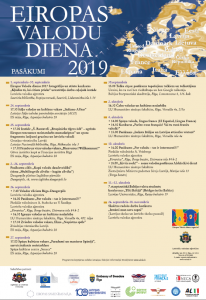 year on September 26 since 2001. The European Day of Languages is celebrated in all the member states of the European Union and it focuses on European languages, linguistic diversity and language learning. Involving several partners, these events have been organized and coordinated by the Latvian Language Agency for the fifteenth year.
year on September 26 since 2001. The European Day of Languages is celebrated in all the member states of the European Union and it focuses on European languages, linguistic diversity and language learning. Involving several partners, these events have been organized and coordinated by the Latvian Language Agency for the fifteenth year.
The first event of the European Day of Languages event program was held on September 1 in the Sauriešu library in Stopiņi district, where the photo exhibition “Kļūdies tā, lai citiem prieks” (“Make mistakes so that everyone can enjoy them”) was open until September 30.
From September 2 to September 26, the Daugavpils City Board of Education organized a series of events titled “Kopā valodu daudzveidībā” (“Together in the diversity of languages”). The main topic of the events was “A multilingual person – a rich person”.
Early on the morning of September 26, everyone traveling to Daugavpils on the 7.40am train had the opportunity to enrich their journey and learn something new about language, literature and the people working in the culture sector on the Language Train from Riga to Daugavpils. The Latvian Language Agency accompanied the passengers aboard the train and the event was hosted by Roberto Meloni with musicians Julgī Stalte and Ēriks Zeps who performed during the trip. Read more
04.10.2019.
„School Bridges” – Cooperation project between schools and other educational establishments in Latvia and Sweden was successfully carried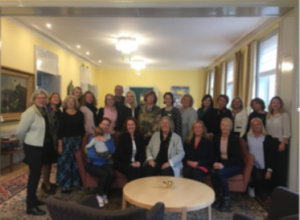 out in Valmiera, Latvia, from 26th to 29th September, 2018. The objective of this project was to promote and facilitate cooperation between schools in Latvia and Sweden.
out in Valmiera, Latvia, from 26th to 29th September, 2018. The objective of this project was to promote and facilitate cooperation between schools in Latvia and Sweden.
First of all 14 guests from Sweden arrived in Riga. Among them were Katrina Freidenwall and 4 other teachers from the Hamnäs School, Nina Lindfors, director of Gripsholm Primary School, one teacher from Mariefred Primary School and Headmaster of the Stockholm Latvian School, Ieva Reine with 3 other teachers.
This four day long visit started with a festive reception for the guests at the Embassy of Sweden in Riga, where the Swedish ambassador, Annika Jagander discussed the project and the visit with participants and wished everyone fuitfull work and successful exchange of experiences.
The introductory evening event at the Vamiera City Museum was inspiring: folklore group „Griezes” gave an interactive performance and engaged the participants giving a chance to join in with their song and dance.
On the 27th of September guests visited Pre-School Educational Establishment „Burtiņš”, where they had a meeting with the rector and a guided tour of the premises and classrooms, observation of some classes and discussion about working methods, as well as participation in interest education classes of choice. Read more
29.08.2019.
Latvian Language Agency is grateful for the genorus support from Estonian – Latvian Crossborder Cooperation Council for production and 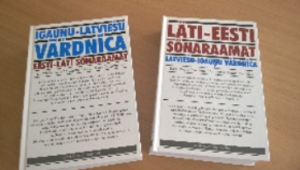 publication of a new Estonian – Latvian Dictionary, and for publication by Estonian Language Agency of a parallell Latvian – Estonian Dictionary, each comprising over 40 000 items.
publication of a new Estonian – Latvian Dictionary, and for publication by Estonian Language Agency of a parallell Latvian – Estonian Dictionary, each comprising over 40 000 items.
In addition to these publications Estonian Language Agency has also created electronic version sof both these dictionaries, whilst Latvian Langage Agency has already published and made available the full electronic version of our dictionary, which will very soon be also made available in Apps for users of Apple iOS and Android platforms.
The Latvian – Estonian Dictionary created by the Estonian Language Agency is a bilingual corpus of parallell texts, worked out via third language, using an innovative method for producing general translation dictionaries in Estonia. The structure, methodic principles and automatic formatting of this dictionary was performed by the project manager Arvi Tavast, but a significant contribution to the creation of this dictionary was also provided by Translation and Language Technology company „Tilde”.
The creators of the Estonian – Latvian Dictionary, published by Latvian Language Agency, were Valts Ernštreits, Marika Muzikante and Maima Grīnberga, the Chief Editor– Valts Ernštreits, and reviewers – Guntars Godiņš un Lembits Vaba. This dictionary was created totally anew and today serves as an up-to-date and richly illustrated assistant to translators from the Estonian language and to learners of both the languages. Dictionary was created by using samples from contemporary language, as well as the corpus of Estonian language currently under construction by the Tartu University (Estonia), latest publications on Estonian language norms and other contemporary research material. Dictionary includes a rich collection of contemporary words and lexical units, that often come up in translation context. Also many new words from contemporary Latvian language have for the first time been included in this dictionary.
Whilst the dictionary of Estonian – Latvian language was being created, all interested parties were welcome to follow the process, because the electronic version of the draft dictionary was constantly made available online thanks to modern user technologies. In the same website www.ee-lv.lv Latvian Language Agency has now published the new approved version of the expanded Estonian – Latvian Electronic Dictionary. The plan is to keep constantly updating and expanding the dictionary, as a result of the on-going cooperation of Latvian and Estonian translators. This will further promote higher quality of translations into both of these languages.
The electronic platform created during the production of the Estonian – Latvian Language Dictionary has been instrumental in the creation of special Applications for Apple iOs and Android smartphones and tablets. Apps will be available as soon as the service providers publish them on their respective sites.
Dictionaries in electronic format are available at: Estonian Language Institute www.eki.ee/dict/lv-et/index.cgi and www.eki.ee/dict/et-lv/ , whilst Latvian Language Agency has published the expanded Estonian – Latvian Dictionary at the site: www.ee-lv.lv/lv/vardnica
Both of these new dictionaries are available for purchase from the Latvian Language agency directly or at all major bookstores.
 teacher at Latvian schools in the USA and Australia.
teacher at Latvian schools in the USA and Australia.






